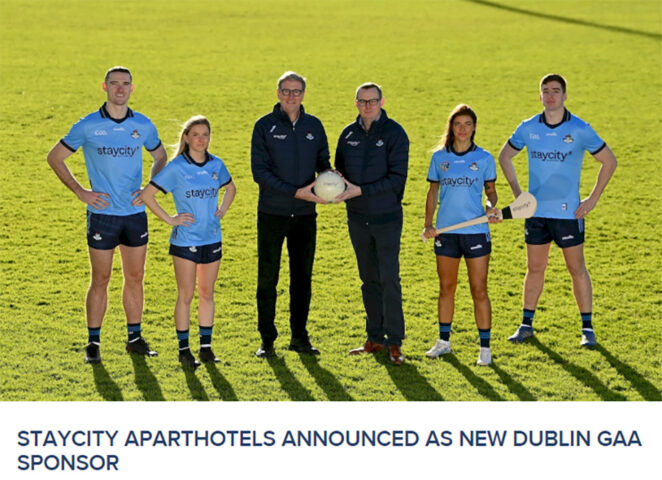Some doomsayers have focused on Dublin GAA’s new sponsor, Staycity, as a possible factor in the county senior footballers and hurlers less than auspicious beginning to 2024. That might seem unfair, but it is worth having a closer look at the company now sponsoring the All-Ireland champions.
The new sponsorship deal, reported to be worth in excess of €5 million over a five year period, was announced last November.
No doubt the two people who established Staycity in 2015, Tom and Gerard Walsh, are supporters of the Dubs, although whether they are denizens of the Hill or Parnell Park I do not know.
The founding story of Staycity is that Tom and his wife rented out their Temple Bar apartment, and well the rest is history.
Fair play to them. No one would resent their success, but Staycity has gone from humble origins to a substantial company. To wit, Staycity now says it manages more than 8,000 apartments in 45 properties across 21 cities – doubling its operations in three years.
That expansion has been fueled by debt and arrangements with the huge overseas investment funds who have come to increasingly dominate the Irish, and global, property market.
Staycity themselves say that “Staycity Group is the leading independent aparthotel operator with institutional investment funds,” and that the company has a “track record of doing multiple deals with well known names such as LaSalle Union Investment, and Knight Frank Investment Management.”
“In recent years well known names such as DEKA, DWS, M&G, ESB Pension fund, Aberdeen Standard, Royal London, Bain Capital, Commerz Real and Union Investment have all invested in Staycity properties and developments.”
“The increasing interest from the investment community in Staycity has assisted in our expansion programme, created greater awareness of our brands and also demonstrates the liquidity of our aparthotels. We continue to work with these funds as well as significant others interested in acquiring Staycity & Wilde aparthotels,” it adds.
The Irish state’s sovereign wealth fund, the Strategic Investment Fund (ISIF), acquired 13% of Staycity in 2020. That deal, which was valued at €30 million, included an agreement that the ISIF would loan money to Staycity to fund its continued expansion. The same year saw the UK “challenger bank” OakNorth also agree to loan Staycity £30 million pounds to help Staycity achieve its dream of expanding “to 18,000 apartments by 2028.”
Few would claim that the consequences of property morphing from a place you can call home to an asset class have been altogether benign. Some young people do well from renting out apartments, others are leaving the country in tens of thousands because they cannot afford to rent or buy a place to live, even when holding down a job that earns a reasonable return.
And in common with all of the other main operators in the Irish hotel sector, Staycity has spotted the opportunity that exists in acquiring contracts from the state to provide accommodation for Ukrainian refugees who are in Temporary Protection.
To the end of September 2023, Staycity had received €4,891,650 in payments made from the Department of Children, Equality, Disability, Integration and Youth (DCEDIY).
How Staycity operates in conjunction with international funds in practice is illustrated by the sale and subsequent lease of what is now the Staycity hotel on Little Mary Street in Dublin.
The 340-unit hotel was bought by the UK company Song Capital Partners in August last year for €100 million from the previous owner US giant Bain Capital which controls almost €180 billion in assets around the world.
Song Capital Partners have one Irish director, Tony McBride who was previously a director of Foscadh Housing, which is an Approved Housing Body. It was founded in 2021 by Dan McKinnon and Tom Pritchard, but has other “institutional partners,” among them the US based Cerberus Capital.
The Little Mary Street hotel deal was described as “one of the largest standalone real estate sales in Dublin’s hospitality sector since the onset of the pandemic”.
The aparthotel on Little Mary Street will be operated on a 25-year lease by Staycity.
Another example is the aparthotel leased to Staycity to manage at the site of the once famous Tivoli theatre in the Liberties.
The site was bought by German based assets management giant DWS in 2019 and the hotel opened at the beginning of 2022 under lease to Staycity. There was much talk about the Tivoli becoming a cultural hub and richness and all the other malarkey that accompanies the radical restructuring of Dublin.
Doubt was cast upon that “vision”, and local councillors, community groups and businesses objected when Staycity applied to have gates erected which it was claimed would deny access to what had promised to be a public space. Former Dublin planner Kieran Rose claimed that the subsequent development of the historic site represented a “dumbing down of the integrity of the planning system” which he said had facilitated the hotel on the understanding that the demolition of the old theatre would be followed by “providing a potential arts and cultural space.”
DWS is mostly owned by Deutsche Bank and managed assets of more than €850 billion in 2023. The involvement of DWS indicates that the German financial elite certainly did not have a bad day when it was one of the main movers behind the signing over of significant sovereign control by the Irish state in the wake of the financial crash wrought by our own less competent “elite.”
I for one will be sticking to my old GAA apparel for days out supporting one of the few things that maintains a sense of community in Dublin these times.


